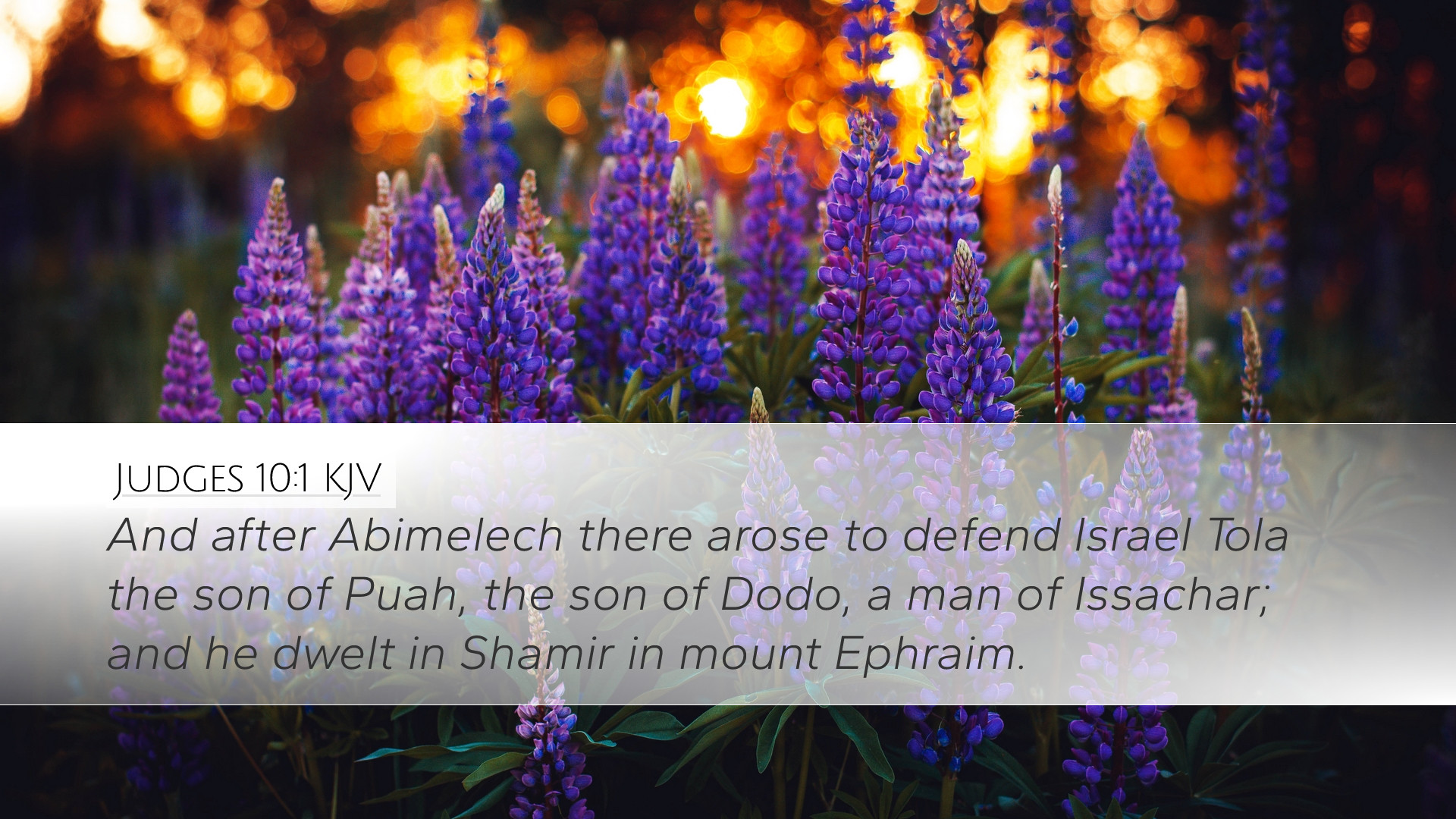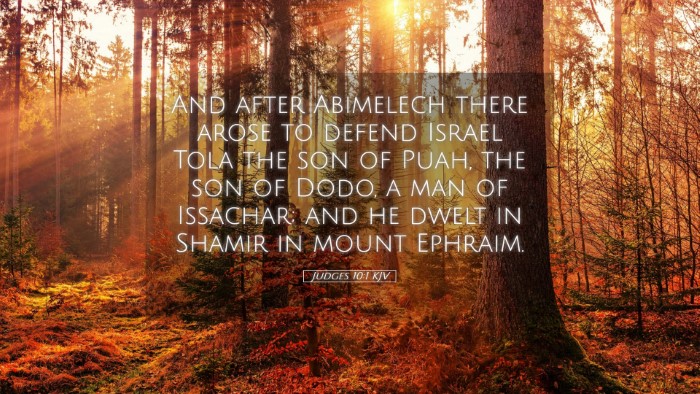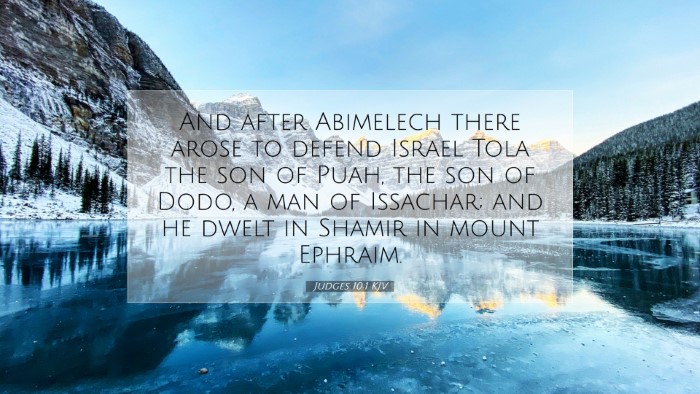Old Testament
Genesis Exodus Leviticus Numbers Deuteronomy Joshua Judges Ruth 1 Samuel 2 Samuel 1 Kings 2 Kings 1 Chronicles 2 Chronicles Ezra Nehemiah Esther Job Psalms Proverbs Ecclesiastes Song of Solomon Isaiah Jeremiah Lamentations Ezekiel Daniel Hosea Joel Amos Obadiah Jonah Micah Nahum Habakkuk Zephaniah Haggai Zechariah MalachiJudges 10:1
Judges 10:1 KJV
And after Abimelech there arose to defend Israel Tola the son of Puah, the son of Dodo, a man of Issachar; and he dwelt in Shamir in mount Ephraim.
Judges 10:1 Bible Commentary
Bible Commentary on Judges 10:1
Judges 10:1 states:
"And after Abimelech there arose to defend Israel Tola the son of Puah, the son of Dodo, a man of Issachar; and he dwelt in Shamir in mount Ephraim."
Introduction
The Book of Judges presents a cyclical pattern of Israel's history, characterized by sin, oppression, repentance, and deliverance. Judges 10:1 introduces Tola, an obscure yet significant figure who rose as a deliverer of Israel after the turbulent reign of Abimelech. This commentary seeks to explore the implications of this verse and the contextual background from various public domain sources.
Historical Context
Following the death of Abimelech, a disturbing period ensued, characterized by civil strife and a lack of true leadership. Tola’s emergence implies a necessary restoration of order and governance among the Israelite tribes.
Tola's Lineage and Character
- Identity: Tola is identified as the son of Puah, the son of Dodo, from the tribe of Issachar. This lineage suggests a connection to significant familial leadership, as noted in the observations of Albert Barnes, who emphasizes the importance of such generational connections in Israel's history.
- Character Assessment: Matthew Henry describes Tola as a "man of Issachar," highlighting that the tribe of Issachar was known for its wise men, which lends credibility to Tola’s qualifications as a leader. His wisdom would have been necessary in times of distress.
Role and Actions of Tola
While the text is brief, various commentaries shed light on Tola’s actions in defending Israel, which emphasizes leadership's attributes during crises.
Deliverance and Defense
- Defending Israel: Tola's role as a defender suggests a proactive stance against the enemies of Israel. Adam Clarke points out that "arose to defend” signifies that Tola did not simply occupy a position of authority but actively engaged in restoring Israel’s security.
- Time of Peace: Henry highlights that Tola judged Israel for 23 years, a period he suggests likely included times of peace and stability, contrasting the prior chaos of Abimelech's rule. This reflects God’s providence in raising leaders in times of need.
The Significance of Tola's Leadership
The brevity of Tola’s mention in scripture does not detract from his significance. Each judge in the Book of Judges serves as a reminder of God's covenant faithfulness despite Israel’s frequent rebellion.
Symbol of Hope
- Restoration: Tola’s leadership is seen as a restoration of order, serving as a symbol of hope for the Israelites. Barnes notes that even in times of despair, God raises leaders who reflect His enduring mercy and desire to guide His people back to Himself.
- Covenantal Theme: The presence of judges like Tola underscores the theme of God's continual covenant interactions with Israel. Clarke elucidates that God’s providence in raising Tola is a manifestation of His unwavering commitment to Israel, even when they stray.
Lessons Learned: Application for Today
Tola's story holds significant implications for contemporary believers, especially pastors and church leaders. His actions encourage the understanding that true leadership arises from a commitment to serve and protect the community. The lessons of stability, wisdom, and the importance of proactive engagement can resonate strongly within today’s church leadership and community interactions.
1. Importance of Spiritual Legacy
Tola’s lineage from the tribe of Issachar reminds us of the importance of spiritual heritage and the impact of our ancestors' faith. Leaders today should be mindful of raising future generations in the faith, just as Tola’s lineage may have contributed to his character.
2. Active Engagement
- Leadership as Service: Tola exemplifies that effective leadership involves action, compassion, and serving the needs of a community. This is a call to modern leaders to not shy away from difficult situations but to rise and offer guidance.
- Wisdom and Discernment: As a wise leader from Issachar, Tola's critical quality of discernment serves as a model for today’s leaders to seek divine wisdom in decision-making and guiding their congregations.
3. Restorative Leadership
The importance of restorative leadership cannot be overstated. Just as Tola brought a sense of restoration after Abimelech’s chaos, modern leaders are called to foster environments of healing and unity within their congregations and communities.
Conclusion
Judges 10:1 serves as a reminder of God’s unwavering commitment to His people, even through seemingly minor figures like Tola. His story illustrates the profound impact that wise leadership can have on society, encouraging current and future leaders to embody these qualities in their ministerial endeavors.


